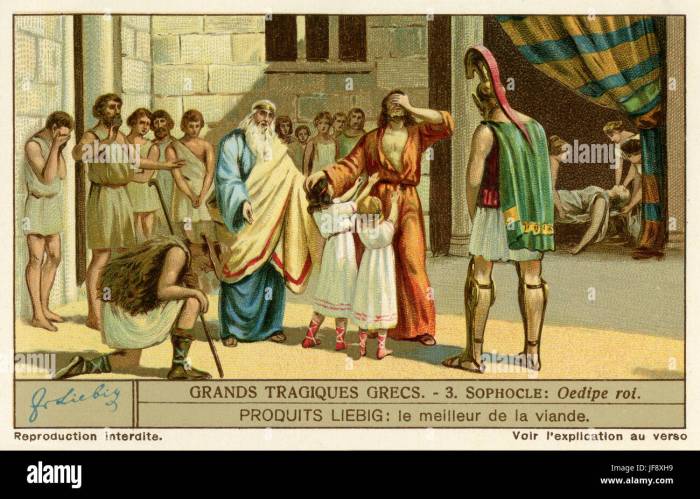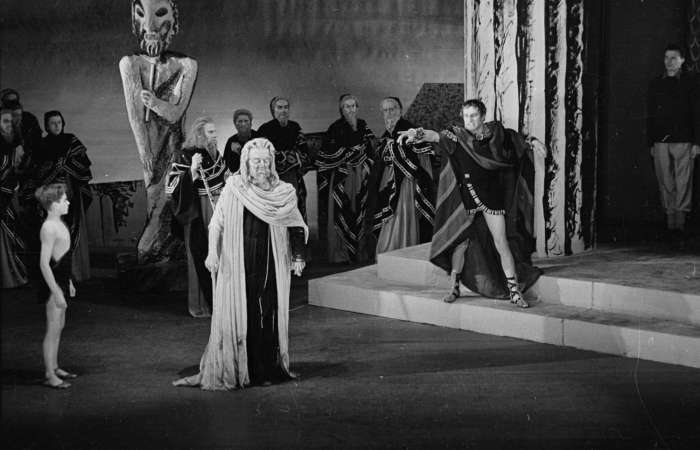Important quotes from Oedipus the King, a timeless masterpiece by Sophocles, offer profound insights into the complexities of human nature, the interplay of fate and free will, and the pursuit of knowledge. These quotes, uttered by the play’s tragic hero Oedipus and other characters, resonate with universal truths that continue to captivate and provoke thought.
Oedipus’s tragic flaw, hubris, or excessive pride, is a central theme explored through his fateful journey. His arrogance and overconfidence lead him to challenge the oracle’s prophecy and embark on a quest that ultimately results in his downfall. The play delves into the significance of fate and the extent to which Oedipus’s actions are predetermined, raising questions about personal responsibility and divine intervention.
The Tragic Flaw: Hubris
Oedipus’s arrogance and overconfidence are evident throughout the play. He believes himself to be invincible and above the gods, a fatal flaw that ultimately leads to his downfall. When the plague strikes Thebes, Oedipus dismisses the prophecies and oracles, believing that he can solve the mystery on his own.
His pride blinds him to the truth, and he refuses to consider the possibility that he is the cause of the city’s suffering.
The Oracle’s Prophecy
The oracle’s prophecy plays a significant role in shaping Oedipus’s actions. The prophecy foretells that Oedipus will kill his father and marry his mother, a horrifying fate that he desperately tries to avoid. However, his attempts to escape his destiny only lead him closer to it, as his search for the truth ultimately reveals his true identity and the horrors he has committed.
Fate and Free Will

The tragedy of Oedipus raises questions about the role of fate and free will. Oedipus’s actions seem to be predetermined by the oracle’s prophecy, but does this mean that he has no choice but to fulfill his destiny? The play suggests that while fate may play a role, Oedipus’s own actions and choices contribute to his downfall.
His hubris and refusal to accept the truth lead him to make decisions that ultimately seal his fate.
Personal Responsibility and Divine Intervention
The tension between personal responsibility and divine intervention is a central theme in Oedipus the King. The play explores the extent to which individuals are responsible for their actions and the role of the gods in shaping their destinies. Oedipus’s tragedy highlights the consequences of arrogance and the importance of accepting one’s own responsibility.
Knowledge and Ignorance

Oedipus’s quest for knowledge is both his driving force and his ultimate downfall. His search for the truth about his past leads him to uncover the horrors of his own actions, but his newfound knowledge only brings him suffering and despair.
The play suggests that there are limits to human knowledge and that sometimes ignorance may be bliss.
The Sphinx’s Riddle
The Sphinx’s riddle plays a significant role in Oedipus’s fate. The riddle, “What is the creature that walks on four legs in the morning, two legs at noon, and three legs in the evening?”, represents the different stages of Oedipus’s life and the journey that leads to his downfall.
Oedipus’s answer to the riddle, “Man,” reveals his own true nature and the tragic destiny that awaits him.
The Power of Language

Language is a powerful tool in Oedipus the King, shaping the characters’ perceptions and actions. The play uses metaphors, symbols, and foreshadowing to create a sense of foreboding and inevitability. The use of irony is particularly effective in highlighting Oedipus’s blindness and the tragic consequences of his actions.
Metaphors and Symbols
The play is rich in metaphors and symbols that foreshadow Oedipus’s downfall. For example, the plague that strikes Thebes represents the moral and spiritual corruption that has infected the city. The Sphinx’s riddle symbolizes the mystery and danger that Oedipus faces in his search for the truth.
The Role of the Chorus
The chorus plays a vital role in Oedipus the King, providing commentary on the action and characters. The chorus represents the voice of the people of Thebes, offering insights into their thoughts and feelings. The chorus also serves as a moral guide, reminding the audience of the importance of humility and the dangers of pride.
Commentary on the Action and Characters
The chorus provides a running commentary on the events of the play, offering insights into the characters’ motivations and the consequences of their actions. The chorus also serves as a voice of reason, reminding the audience of the moral and ethical implications of the story.
Character Development
Oedipus undergoes a significant transformation throughout the play. Initially, he is a confident and arrogant ruler, but as the truth about his past is revealed, he becomes increasingly isolated and despairing. Oedipus’s journey is a tragic one, but it also reveals the power of self-discovery and the importance of accepting one’s own responsibility.
Psychological and Emotional Changes, Important quotes from oedipus the king
Oedipus experiences a range of psychological and emotional changes throughout the play. Initially, he is driven by pride and ambition, but as the truth about his past is revealed, he becomes increasingly guilt-ridden and self-destructive. Oedipus’s journey is a powerful exploration of the human psyche and the complexities of the human condition.
Q&A: Important Quotes From Oedipus The King
What is the significance of the oracle’s prophecy in Oedipus the King?
The oracle’s prophecy plays a crucial role in shaping Oedipus’s actions and ultimately leading to his downfall. It foretells that he will kill his father and marry his mother, a prophecy that Oedipus desperately tries to avoid but ultimately fulfills.
How does Oedipus’s quest for knowledge contribute to his downfall?
Oedipus’s relentless pursuit of truth and knowledge ironically leads to his destruction. His determination to uncover the truth about his past, despite warnings and obstacles, ultimately reveals his tragic fate and the consequences of his actions.
What is the role of the chorus in Oedipus the King?
The chorus serves as a collective voice, commenting on the action and characters of the play. It provides insights into the themes, foreshadows events, and reflects the audience’s reactions to the unfolding tragedy.